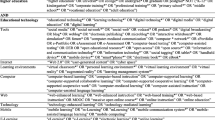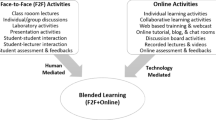Abstract
This qualitative research study explored motivational teaching techniques used by instructors of distance learning programmes (DLPs) to assist adult learners in achieving learning outcomes that meet their educational goals. The authors investigated how 11 instructors in a DLP at a large university in Ghana, Africa, applied the techniques, as well as the challenges they faced. The instructors were purposively selected for face-to-face individual interviews and classroom observations. Data were analysed using content, constant comparison and thematic approaches. The findings revealed that in their teaching of adults, the instructors used different motivational techniques, described in this research as patching, resting, piecemealing, shared learning and opportunity to try. Although the choice of techniques overlapped among the instructors in the sample, they each applied them differently to help their adult learners to learn effectively. The instructors also encountered challenges (teaching frustrations), such as learner absenteeism, unwillingness to accept change, disrespect and the lack of preparedness. These findings led to the conclusion that indisciplined learner behaviour can cause underperformance. Given that the instructors faced diverse challenges, the authors recommend that open and distance learning (ODL) instructors in Ghana take advantage of professional development opportunities to keep up to date with techniques for managing complex adult learning environments and issues. Internationally, the findings of this study highlight the need for ODL providers around the world to regularly review their services to ensure that the challenges instructors and learners are facing are addressed in a timely manner. This will ensure that ODL remains a viable alternative mode of education, especially during exceptional circumstances like COVID-19 lockdowns.
Résumé
Le rôle des techniques motivationnelles d’enseignement dans les programmes d’apprentissage à distance pour adultes – Cette étude qualitative se penche sur les techniques motivationnelles d’enseignement utilisées par les enseignants de programmes d’apprentissage à distance pour adultes (PAD) dans le but d’aider les apprenants adultes à obtenir des résultats correspondant à leurs objectifs éducatifs. Les auteurs ont examiné comment 11 enseignants d’un programme d’apprentissage à distance d’une grande université africaine au Ghana employaient ces techniques et étudié les difficultés auxquelles ils faisaient face. Les enseignants ont été choisis à dessein pour réaliser des interviews individuelles en face-à-face et des observations en classe. Les données collectées ont été analysées sur la base des contenus, d’une comparaison constante et d’approches thématiques. Les résultats ont révélé que dans leur activité pédagogique avec des adultes, les enseignants recouraient à différentes techniques motivationnelles qualifiées de patching, resting, piecemealing, shared learning and opportunity to try (stratégie de correctifs, mise au repos, approche fragmentaire, apprentissage partagé et occasion d’essayer) dans cette étude. Les enseignants de l’échantillon ont certes choisi des techniques qui se recoupent, mais ils les emploient de différentes façons pour aider les apprenants adultes à apprendre efficacement. Ils rencontraient aussi des difficultés (des frustrations pédagogiques) comme l’absentéisme des apprenants, la réticence à accepter le changement, l’irrespect et le manque de préparation. Ces résultats ont conduit à conclure que le comportement indiscipliné des apprenants peut se traduire par de mauvais résultats. Étant donné que les enseignants se trouvent confrontés à des difficultés diverses, les auteurs recommandent que ceux qui interviennent au Ghana dans des programmes d’enseignement ouvert à distance (EOD) tirent parti des possibilités de développement professionnel pour se tenir au courant des techniques utilisées pour gérer les environnements et sujets complexes de l’apprentissage des adultes. Sur le plan international, les résultats de cette étude soulignent la nécessité pour les fournisseurs de programmes d’enseignement ouvert à distance dans le monde entier d’examiner régulièrement leurs services pour veiller à répondre à temps aux difficultés auxquelles font face enseignants et apprenants. Cela permettra de garantir que les programmes d’enseignement ouvert à distance, en particulier dans des situations exceptionnelles comme les confinements durant la pandémie de COVID-19, restent un mode d’éducation alternatif viable.
Similar content being viewed by others
Notes
Most universities in Africa require mature-age learners to be 25 or over.
According to Ethnologue: Languages of the world, an online database, Ghana is “home to 73 living indigenous languages. … In addition, 10 living non-indigenous languages are established within the country. One of these, English, is the official language of the country. In formal education, 9 indigenous languages are used as languages of instruction” (Ethnologue n.d.).
A level 300 course is equivalent to the third year of a bachelor’s degree programme.
References
Alam, M. T., & Farid, S. (2011). Factors affecting teachers’ motivation. International Journal of Business and Social Science, 2(1), 298–304.
Amponsah, S. (2020). Exploring the dominant learning styles of adult learners in higher education. International Review of Education, 66(4), 531–550. https://doi.org/10.1007/s11159-020-09845-y
Baker, V. L., Lunsford, L. G., & Pifer, M. J. (2019). Patching up the “leaking leadership pipeline”: Fostering mid-career faculty succession management. Research in Higher Education, 60(6), 823–843. https://doi.org/10.1007/s11162-018-9528-9
Benneh, C. O., & Amponsah, S. (2018). Information assimilation by adult learners in a Ghanaian tertiary institution: The use of lecture method. African Journal of Pedagogy and Curriculum, 5(1), 15–28.
Biney, I. K., & Worlanyo, E. (2015). Learning by distance: Prospects, challenges and strategies. Unified Journal of Educational Research and General Studies, 1(3), 21–28.
Conti, G. J., & Welborn, R. B. (1986). Teaching-learning styles and the adult learner. Lifelong Learning, 9(8), 20–23.
Cortesão, L. (2011). Teachers and “resting routines”: Reflections on cognitive justice, inclusion and the pedagogy of poverty. Improving Schools, 14(3), 258–267. https://doi.org/10.1177/1365480211422284
Creswell, J. (Ed.) (2007). Five qualitative approaches to inquiry. In Qualitative Inquiry and research design: Choosing among five approaches (pp. 53–84). Thousand Oaks, CA: SAGE.
Cross, K. P. (1981). Adults as learners. increasing participation and facilitating learning. San Francisco, CA: Jossey-Bass.
Denscombe, M. (1998). The good research guide: For small-scale social research projects. Buckingham: Open University Press.
Denzin, N. K., & Lincoln, Y. S. (2011). The SAGE handbook on qualitative research (4th ed.). Thousand Oaks, CA: SAGE.
Dörnyei, Z., & Kubanyiova, M. (2014). Motivating learners, motivating teachers. Cambridge: Cambridge University Press.
Erdil-Moody, Z., & Thompson, A. S. (2020). Exploring motivational strategies in higher education: Student and instructor perceptions. Eurasian Journal of Applied Linguistics, 6(3), 387–413. https://doi.org/10.32601/ejal.834670
Ethnologue (n.d.). Languages of the world: Ghana [online resource]. Dallas, TX: SIL International. Retrieved 14 August 2023 from https://www.ethnologue.com/country/GH/
Faizah, A. M., & Hazadiah, M. D. (2010). An assessment of 21st century adult learners’ needs: Issues and challenges for institutions of higher education. Strategies for Malaysian education in the 21st century. In Y. Ros Aizan, N. Norshidah, A. W. Rohaya, S. Norshiha & J. J. Walters (Eds), Strategies for Malaysian education in the 21st century (pp. 53–76). Shah Alam: University Publication Centre (UPENA), Universiti Teknologi Mara.
Fasokun, T. O., Katahoire, A., & Oduaran, A. (2005). The psychology of adult learning in Africa. Hamburg/Cape Town: UNESCO Institute for Education (UIE)/Pearson Education South Africa. Retrieved 24 July 2023 from https://unesdoc.unesco.org/ark:/48223/pf0000141339
Glover, I. (2013). Play as you learn: Gamification as a technique for motivating learners. In J. Herrington, A. Couros, & V. Irvine (Eds), Proceedings of the World Conference on Educational Multimedia, Hypermedia and Telecommunications 2013 (pp. 1999–2008). Chesapeake, VA: Association for the Advancement of Computing in Education (AACE). Author-deposited version retrieved 24 July 2023 from http://shura.shu.ac.uk/7172/1/glover_-_play_as_you_learn_-_proceeding_112246.pdf
Goodlad, J. (2005). Principles of adult learning – adapted from John Goodlad [online study note; Best Practice Resources]. StudyLib document storage platform. Retrieved 14 August 2023 from https://studylib.net/doc/18230401/principles-of-adult-learning
Kara, M., Erdogdu, F., Kokoç, M., & Cagiltay, K. (2019). Challenges faced by adult learners in online distance education: A literature review. Open Praxis, 11(1), 5–22. Retrieved 24 July 2023 from https://files.eric.ed.gov/fulltext/EJ1213733.pdf
Keller, J. M. (1983). Motivational design of instruction. In C. M. Reigeluth (Ed.), Instructional-design theories and models: An overview of their current status (pp. 383–434). Hillsdale, NJ: Lawrence Erlbaum Associates.
Keller, J. M. (1984). The use of the ARCS model of motivation in teacher training. In K. Shaw & A. J. Trott (Eds.), Aspects of Educational Technology Volume XVII: staff Development and Career Updating. Kogan Page.
Keller, J. M. (1987). Development and use of the ARCS model of motivational design. Journal of Instructional Development, 10(3), 2–10. https://doi.org/10.1007/BF02905780
Keller, J. M. (2010). Motivational design for learning and performance: The ARCS model approach. New York, NY: Springer Science+Business Media. https://doi.org/10.1007/978-1-4419-1250-3
Kimmel, S. B., & McNeese, M. N. (2006). Barriers to business education: Motivating adult learners. Journal of Behavioral & Applied Management, 7(3), 292–303. https://doi.org/10.21818/001c.16672
Knowles, M. (1996). Andragogy: An emerging technology for adult learning. In R. Edwards, A. Hanson, & P. Raggatt (Eds.), Boundaries of adult learning: Adult learning, education and training (pp. 82–98). London/New York: Routledge.
Knowles, M. S., Holton, E. F., III., & Swanson, R. A. (2014). The adult learner: The definitive classic in adult education and human resource development. London: Routledge.
Lieb, S. (1991). Principles of adult learning [online brief]. Phoenix, AZ: Vision-South Mountain Community College. Retrieved 14 August 2023 from https://petsalliance.org/sites/petsalliance.org/files/Lieb%201991%20Adult%20Learning%20Principles.pdf
Luke, D., & Justice, M. (2016). Motivating adult learners: Exploring the emergence of adult business students in an East Texas University. Administrative Issues Journal: Connecting Education, Practice, and Research, 6(2), 74–82. https://doi.org/10.5929/2016.6.2.3
Malik, S. (2014). Effectiveness of ARCS model of motivational design to overcome non completion rate of students in distance education. Turkish Online Journal of Distance Education, 15(2), 194–200.
Malone, S. (2014). Characteristics of adult learners. Training & Development, 41(6), 10–13.
Micari, M., & Calkins, S. (2019). Is it OK to ask? The impact of instructor openness to questions on student help-seeking and academic outcomes. Active Learning in Higher Education. https://doi.org/10.1177/1469787419846620
Owusu-Agyeman, Y., Fourie-Malherbe, M., & Frick, L. (2018). Exploring the educational needs of adult learners: A study of three universities in Ghana. Journal of Adult and Continuing Education, 24(2), 165–187. https://doi.org/10.1177/1477971418782997
Raver, S. A., & Maydosz, A. S. (2010). Impact of the provision and timing of instructor-provided notes on university students’ learning. Active Learning in Higher Education, 11(3), 189–200. https://doi.org/10.1177/1469787410379682
Ravishankar, R., Adreak, N. A., & Vervoort, D. (2021). Shared learning in and beyond the COVID-19 pandemic. European Journal of Cardio-Thoracic Surgery, 60(1), 206–207. https://doi.org/10.1093/ejcts/ezab023
Salifu, I., Alagbela, A. A., & Ofori, C. G. (2018). Factors influencing teaching as a career choice (FIT-Choice) in Ghana. Teaching Education, 29(2), 111–134. https://doi.org/10.1080/10476210.2017.1365360
Sogunro, O. A. (2015). Motivating factors for adult learners in higher education. International Journal of Higher Education, 4(1), 22–37. https://doi.org/10.5430/ijhe.v4n1p22
Stoycheva, D. (2018). Piecemeal change in higher education: An example of curriculum re-conceptualization. Annual Graduate Student Symposium, 21 [open access poster presentation]. Cedar Falls, IA: University of Northern Iowa. Retrieved 25 July 2023 from https://scholarworks.uni.edu/cgi/viewcontent.cgi?article=1208&context=agss
UG CoE (University of Ghana College of Education). (2020). Mature students’ admissions since 2016/2017 Academic Year. Unpublished report. Accra: University of Ghana, College of Education Academic Affairs office.
Wolfgang, M. E., & Dowling, W. D. (1981). Differences in motivation of adult and younger undergraduates. The Journal of Higher Education, 52(6), 640–648. https://doi.org/10.2307/1981772
Wlodkowski, R. J. (2008). Enhancing adult motivation to learn: A comprehensive guide for teaching all adults (3rd ed.). San Francisco, CA: Jossey-Bass.
Acknowledgements
The authors gratefully acknowledge the immense contributions of colleagues who provided the needed feedback for an improvement of the research.
Funding
The authors received no financial support for the research, authorship, and/or publication of this article.
Author information
Authors and Affiliations
Corresponding author
Ethics declarations
Conflict of interest
The authors declare no potential conflicts of interest with respect to the research, authorship, and/or publication of this article.
Additional information
Publisher's Note
Springer Nature remains neutral with regard to jurisdictional claims in published maps and institutional affiliations.
Rights and permissions
Springer Nature or its licensor (e.g. a society or other partner) holds exclusive rights to this article under a publishing agreement with the author(s) or other rightsholder(s); author self-archiving of the accepted manuscript version of this article is solely governed by the terms of such publishing agreement and applicable law.
About this article
Cite this article
Salifu, I., Biney, I.K. The role of motivational teaching techniques in adult distance learning programmes. Int Rev Educ 69, 467–485 (2023). https://doi.org/10.1007/s11159-023-09997-7
Published:
Issue Date:
DOI: https://doi.org/10.1007/s11159-023-09997-7




